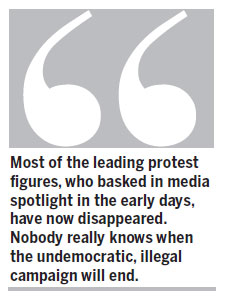'Occupy' hindering HK's political development
Updated: 2014-11-07 08:17
By Chan Tat-leung(HK Edition)
|
|||||||||

I have followed the public debate over Hong Kong's constitutional reform daily over the past month or so.
I must say "Occupy Central" has failed to live up to its initial aspirations of launching a "peaceful" campaign. Some participants behaved violently during confrontations with police officers, who were merely trying to maintain order. Nor were these confrontations limited to Central. Some protesters used aggressive tactics to obstruct police, while others behaved very irrationally. Their unlawful and unreasonable conduct created considerable problems. Even court orders requiring them to end the blockades at some locations have been ignored - much to the detriment of the city's long tradition of respect for the rule of law.
I fear Hong Kong's reputation as a fair, honest law-abiding, friendly and open society - respected around the world - is being badly tarnished. In the past month or so, television news has shown many scenes of "occupiers" becoming aggressive with anyone daring to challenge or criticize them. Sometimes their angry behavior is clearly meant to intimidate people.
The SAR government held its first dialogue with student leaders, and proposed ways to continue the dialogue, but the blockades have yet to end. Most of the leading protest figures, who basked in the media spotlight in the early days, have now disappeared. Nobody really knows when the undemocratic, illegal campaign will end.
After more than a month of the "Occupy" campaign, certain main roads remain blocked. The protests continue to hurt local residents' livelihoods with currently no sign of an end to the campaign. The academics, students and lawmakers promoting "Occupy" have not come up with a plan to end the illegal blockades. I wonder whether they really have one. Maybe their only interest is in their own political agenda and they are actually prepared to hurt Hong Kong, in the name of "genuine universal suffrage".
According to the "five-step process" for implementing universal suffrage in Chief Executive elections from 2017, it is time to take the third step. This follows the framework decided by the National People's Congress Standing Committee (NPCSC) and Article 45 of the Basic Law. A reform package needs to be formulated on the composition of the Nominating Committee (NC) - the different groups and the number of members. Once this is done, the Legislative Council (LegCo) can vote on it. When LegCo accepts it, the SAR government will present these proposals to the NPCSC for approval. This process will ensure universal suffrage can be implemented in the 2017 CE election.
I believe this is how the great majority of Hong Kong residents want constitutional development to progress. They do not support the ridiculous demands of the "occupiers". The protesters have contributed nothing constructive to this process so far. There is only one thing they have been consistent in: refusing to follow the Basic Law and relevant decisions of the NPCSC.
Article 45 of the Basic Law stipulates: "The Chief Executive of the Hong Kong Special Administrative Region shall be selected by election or through consultations held locally and be appointed by the Central People's Government. The method for selecting the Chief Executive shall be specified in the light of the actual situation in the Hong Kong Special Administrative Region and in accordance with the principle of gradual and orderly progress. The ultimate aim is the selection of the Chief Executive by universal suffrage upon nomination by a broadly representative nominating committee in accordance with democratic procedures."
The "occupiers" and opposition politicians clearly don't care about true democracy. They not only ignore opposing arguments, but spitefully attack those who don't agree with them. Their illegal movement is not democracy but rather the hijacking of democracy for the sake of their own agenda.
I hope the students involved in "Occupy" return to school and work for Hong Kong's as well as their own futures. Their parents, teachers and Hong Kong society expect them to do this. Hong Kong's constitutional reforms will proceed according to the Basic Law and relevant decisions of the NPCSC despite temporary obstacles such as the illegal "Occupy" campaign.
Many Western countries took generations to improve their democratic systems. None of them did it in one "giant leap". In regard to "universal suffrage", for example, it took the United States, United Kingdom and France a century or more to grant women the vote. Hong Kong has been lucky in this regard because it will only be 20 years from the handover that universal suffrage is established according to the Basic Law. I'm sure the great majority of Hong Kong people will appreciate having that in 2017.
I hope the city can overcome these current problems and achieve universal suffrage by reaching consensus through rational consultation and cooperation.
The author is director of the Chinese in Britain Forum. He was the first ever Chinese British citizen to be elected mayor of the Greater London Borough of Redbridge (2009-10) and served as a member of the city council for more than 10 years. The Chinese version of this article first appeared in China Business Gazette.
(HK Edition 11/07/2014 page10)